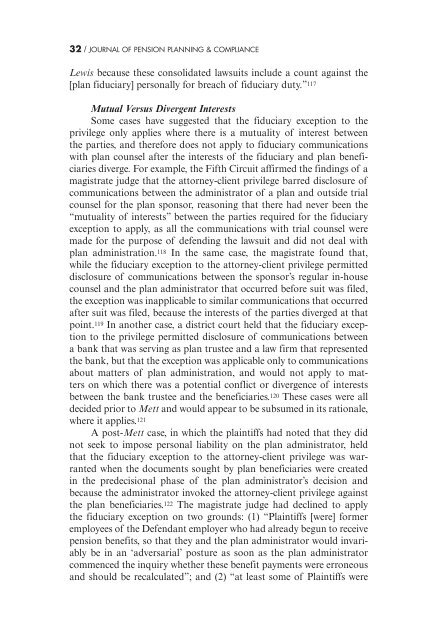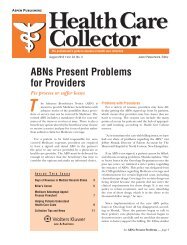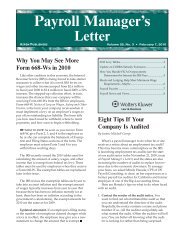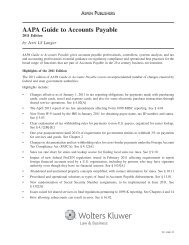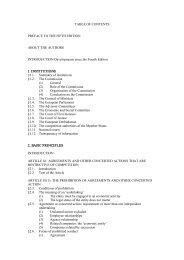journal of pension planning & compliance - Kluwer Law International
journal of pension planning & compliance - Kluwer Law International
journal of pension planning & compliance - Kluwer Law International
You also want an ePaper? Increase the reach of your titles
YUMPU automatically turns print PDFs into web optimized ePapers that Google loves.
32 / JOURNAL OF PENSION PLANNING & COMPLIANCE<br />
Lewis because these consolidated lawsuits include a count against the<br />
[plan fiduciary] personally for breach <strong>of</strong> fiduciary duty.” 117<br />
Mutual Versus Divergent Interests<br />
Some cases have suggested that the fiduciary exception to the<br />
privilege only applies where there is a mutuality <strong>of</strong> interest between<br />
the parties, and therefore does not apply to fiduciary communications<br />
with plan counsel after the interests <strong>of</strong> the fiduciary and plan beneficiaries<br />
diverge. For example, the Fifth Circuit affirmed the findings <strong>of</strong> a<br />
magistrate judge that the attorney-client privilege barred disclosure <strong>of</strong><br />
communications between the administrator <strong>of</strong> a plan and outside trial<br />
counsel for the plan sponsor, reasoning that there had never been the<br />
“mutuality <strong>of</strong> interests” between the parties required for the fiduciary<br />
exception to apply, as all the communications with trial counsel were<br />
made for the purpose <strong>of</strong> defending the lawsuit and did not deal with<br />
plan administration. 118 In the same case, the magistrate found that,<br />
while the fiduciary exception to the attorney-client privilege permitted<br />
disclosure <strong>of</strong> communications between the sponsor’s regular in-house<br />
counsel and the plan administrator that occurred before suit was filed,<br />
the exception was inapplicable to similar communications that occurred<br />
after suit was filed, because the interests <strong>of</strong> the parties diverged at that<br />
point. 119 In another case, a district court held that the fiduciary exception<br />
to the privilege permitted disclosure <strong>of</strong> communications between<br />
a bank that was serving as plan trustee and a law firm that represented<br />
the bank, but that the exception was applicable only to communications<br />
about matters <strong>of</strong> plan administration, and would not apply to matters<br />
on which there was a potential conflict or divergence <strong>of</strong> interests<br />
between the bank trustee and the beneficiaries. 120 These cases were all<br />
decided prior to Mett and would appear to be subsumed in its rationale,<br />
where it applies. 121<br />
A post- Mett case, in which the plaintiffs had noted that they did<br />
not seek to impose personal liability on the plan administrator, held<br />
that the fiduciary exception to the attorney-client privilege was warranted<br />
when the documents sought by plan beneficiaries were created<br />
in the predecisional phase <strong>of</strong> the plan administrator’s decision and<br />
because the administrator invoked the attorney-client privilege against<br />
the plan beneficiaries. 122 The magistrate judge had declined to apply<br />
the fiduciary exception on two grounds: (1) “Plaintiffs [were] former<br />
employees <strong>of</strong> the Defendant employer who had already begun to receive<br />
<strong>pension</strong> benefits, so that they and the plan administrator would invariably<br />
be in an ‘adversarial’ posture as soon as the plan administrator<br />
commenced the inquiry whether these benefit payments were erroneous<br />
and should be recalculated”; and (2) “at least some <strong>of</strong> Plaintiffs were


